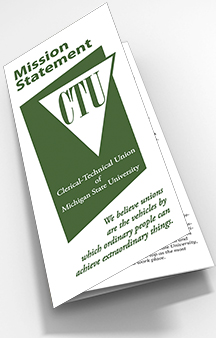The Clerical-Technical Union of Michigan State University (CTU) is committed to the empowerment and dignity of the individual; democracy; diversity; and social justice through pursuit of fair wages, safe and humane working conditions; and the right to have a voice in decisions that affect CTs’ lives.
CTU’s mission is to empower its members to exert control and choice over their own lives. To do so, it develops leaders who direct CTs’ collective resources and power to achieve the aims of the membership.
These aims are based on a foundation of values which include the affirmation of human dignity, respect for diversity, and promotion of social justice.
This mission can only be accomplished if members’ individual talents and skills, as well as their concerns, are transformed into purposeful collective action for change.
To that end, CTU is committed to achieving the highest possible standards of communication, education, and training throughout the organization.
Purpose
“The purpose of CTU is to represent its members in all conditions of their employment and to provide a democratic process by which this purpose can be accomplished. Additionally, the purpose is to give assistance and encouragement to other employees in organizing for the purpose of collective bargaining and to engage in such activities as may be necessary to strengthen the labor movement by chartering affiliated organizations and/or other appropriate means.” — from the CTU Constitution, Article II
Major Stakeholders
CTU serves its members and their families, the MSU and local community, as well as the labor movement as a whole, as it carries out its mission.
Strategic Directions
- Maintaining and extending CTU’s strong contract, continuing to fight for improvements in wages, benefits, and working conditions for all members.
- Maintaining CTU’s sound financial base through a prudent investment program and budget planning based on achieving organizational goals and objectives.
- Continuing to stress effective communications with the membership through a variety of methods, including the newsletter, quarterly membership meetings, and member activities.
- Instituting an organizing approach to administering the contract. The union is strengthened to the extent its members are empowered to participate in the defense of their own rights.
- Enhancing diversity in the leadership of the organization and promoting and supporting it in the workplace.
- Establishing a comprehensive union education program that will produce a trained leadership team of Board, URs, and staff that empowers others and is respected by those it represents.
- Leadership training to encourage more one-on-one discussions and small group meetings to enable union representatives to build a solid foundation at every work site of an informed, unified, and active membership.
- Commitment to an ongoing strategic planning process in developing CTU’s goals, objectives, negotiating positions, and financial projections.
- Cooperative interaction with other unions and organizations sharing the same values, to learn from them and to make a positive contribution on our members’ behalf.
- Continued progress toward the development of effective and fair employment policies, compensation packages, and work standards for CTU staff.
CTU Vision
Successfully carrying out CTU’s mission means:
- Negotiating and defending a strong, innovative CTU contract with fair wages, benefits, and working conditions.
- Effective and sensitive representation of members.
- Active, involved, and educated members prepared to effectively use their power individually and collectively.
- Diverse opportunities for members’ involvement, growth, and development.
- Positive community involvement.
- Building membership respect and trust in a diverse and knowledgeable leadership team.
- Financial strength and consistent progress toward goals.
Background to the CTU Mission Statement
Unions around the world are facing a radically changing environment, and CTU is no exception. Therefore, the union turned to strategic planning, a tool that has been used since the 1950s by innovative organizations to anticipate change and to successfully adapt to change.
The CTU Executive Board engaged Dr. Hal Stack, then Director of the School of Labor and Industrial Relations, Wayne State University, to assist CTU in developing and maintaining a strategic planning process.
The Executive Board and staff developed the initial draft of this mission statement and outlined concrete goals and objectives. Union representatives provided input for the final draft. It was unanimously approved by the Executive Board on September 22, 1992, and then presented to the membership the following month at the Quarterly Membership Meeting.
This statement and the Board’s goals and objectives define CTU’s direction and shared values and provide a foundation for action.
Unanimously reaffirmed by the CTU membership, January 29, 2003. Updated and unanimously reaffirmed by the CTU Executive Board and Union Representatives, January 26, 2016. Unanimously reaffirmed by the CTU membership, January 27, 2016.

